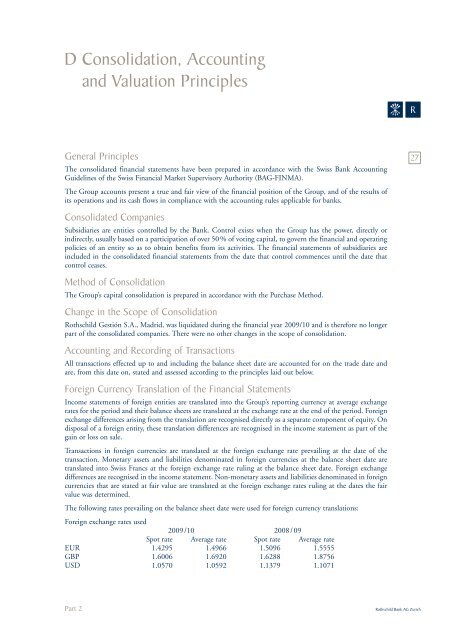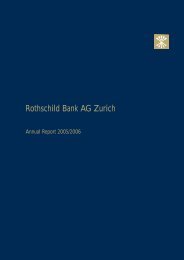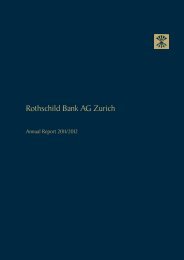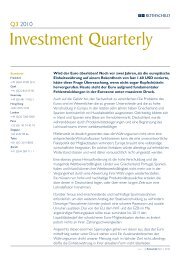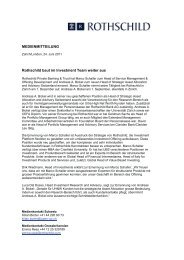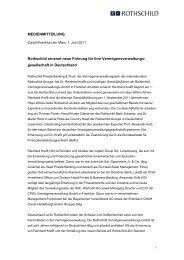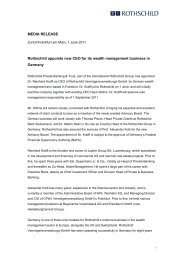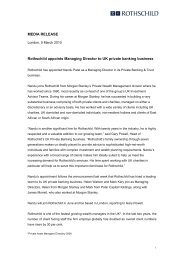Rothschild Bank AG Zurich - Rothschild | Private Banking & Trust
Rothschild Bank AG Zurich - Rothschild | Private Banking & Trust
Rothschild Bank AG Zurich - Rothschild | Private Banking & Trust
You also want an ePaper? Increase the reach of your titles
YUMPU automatically turns print PDFs into web optimized ePapers that Google loves.
D Consolidation, Accounting<br />
and Valuation Principles<br />
General Principles<br />
The consolidated financial statements have been prepared in accordance with the Swiss <strong>Bank</strong> Accounting<br />
Guidelines of the Swiss Financial Market Supervisory Authority (B<strong>AG</strong>-FINMA).<br />
The Group accounts present a true and fair view of the financial position of the Group, and of the results of<br />
its operations and its cash flows in compliance with the accounting rules applicable for banks.<br />
Consolidated Companies<br />
Subsidiaries are entities controlled by the <strong>Bank</strong>. Control exists when the Group has the power, directly or<br />
indirectly, usually based on a participation of over 50 % of voting capital, to govern the financial and operating<br />
policies of an entity so as to obtain benefits from its activities. The financial statements of subsidiaries are<br />
included in the consolidated financial statements from the date that control commences until the date that<br />
control ceases.<br />
Method of Consolidation<br />
The Group’s capital consolidation is prepared in accordance with the Purchase Method.<br />
Change in the Scope of Consolidation<br />
<strong>Rothschild</strong> Gestión S.A., Madrid, was liquidated during the financial year 2009/10 and is therefore no longer<br />
part of the consolidated companies. There were no other changes in the scope of consolidation.<br />
Accounting and Recording of Transactions<br />
All transactions effected up to and including the balance sheet date are accounted for on the trade date and<br />
are, from this date on, stated and assessed according to the principles laid out below.<br />
Foreign Currency Translation of the Financial Statements<br />
Income statements of foreign entities are translated into the Group’s reporting currency at average exchange<br />
rates for the period and their balance sheets are translated at the exchange rate at the end of the period. Foreign<br />
exchange differences arising from the translation are recognised directly as a separate component of equity. On<br />
disposal of a foreign entity, these translation differences are recognised in the income statement as part of the<br />
gain or loss on sale.<br />
Transactions in foreign currencies are translated at the foreign exchange rate prevailing at the date of the<br />
transaction. Monetary assets and liabilities denominated in foreign currencies at the balance sheet date are<br />
translated into Swiss Francs at the foreign exchange rate ruling at the balance sheet date. Foreign exchange<br />
differences are recognised in the income statement. Non-monetary assets and liabilities denominated in foreign<br />
currencies that are stated at fair value are translated at the foreign exchange rates ruling at the dates the fair<br />
value was determined.<br />
The following rates prevailing on the balance sheet date were used for foreign currency translations:<br />
Foreign exchange rates used<br />
2009 /10 2008 / 09<br />
Spot rate Average rate Spot rate Average rate<br />
EUR 1.4295 1.4966 1.5096 1.5555<br />
GBP 1.6006 1.6920 1.6288 1.8756<br />
USD 1.0570 1.0592 1.1379 1.1071<br />
Part 2<br />
R<br />
27<br />
<strong>Rothschild</strong> <strong>Bank</strong> <strong>AG</strong> <strong>Zurich</strong>


